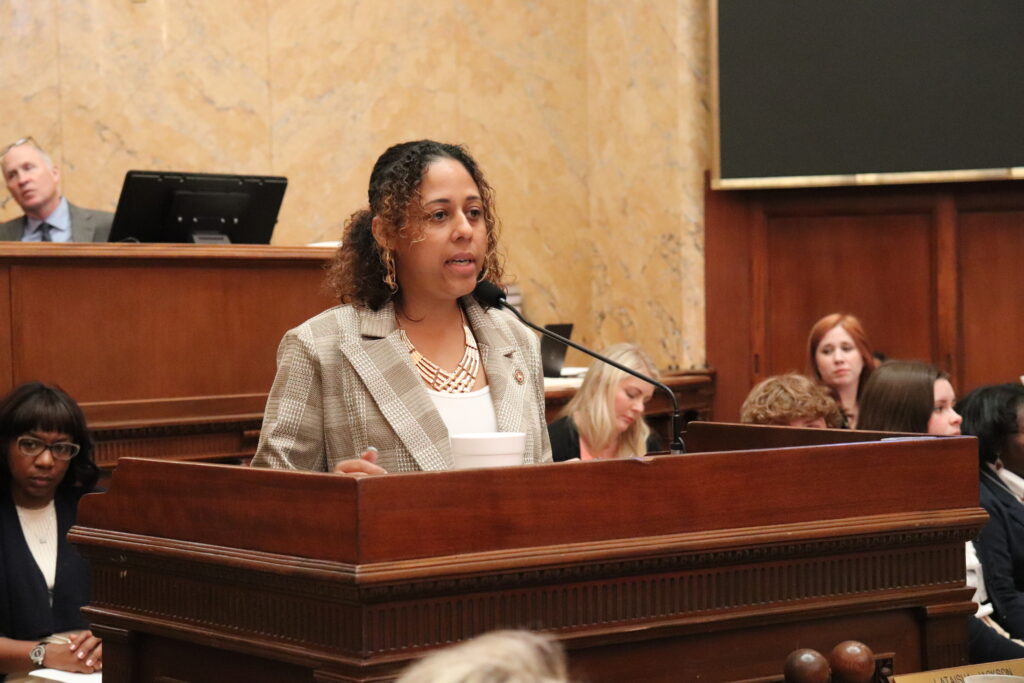
Mississippi State Rep. Dana McLean, R-Columbus, Wednesday, Jan. 31, 2024, at the Mississippi Capitol in Jackson, Miss. (AP Photo/Rogelio V. Solis)
- State Rep. Dana McLean says her bill seeks to provide clarity, certainty and uniformity as to how Mississippi women are treated under Mississippi law.
The Mississippi Women’s Bill of Rights, HB 1607, passed in the House of Representatives on Wednesday by a vote of 82-30. All of the members opposed to the bill were Democrats.
The bill, authored by State Representative Dana McLean (R), seeks to define the biological sex of male and female for the purpose of providing clarification in Mississippi state law. The legislation also defines the terms “man,” “woman,” “girl,” and “boy,” State Representative Joey Hood (R) said while presenting the bill on the floor of the House.
There are no legal penalties included in the bill, and there is no inclusion or exclusion of rights.
Two proposed amendments – one related to hair styles and another regarding access to contraception – did not make it into the bill before it passed the chamber. The four-page bill received scrutiny from those members in opposition for being an “empty bill,” similar to what was introduced in the 2023 session.
What’s in the bill?
The House legislation includes terminology defining the sexes, with female being defined as a person who has the “reproductive system that at some point produces ova” and male defined as a person who has the “reproductive system that at some point produces sperm.”
The measure defines “sex” as “a person’s biological sex, either male or female, as observed or clinically verified at birth.”
“‘Sex’ is objective and fixed: there are only two (2) sexes, and every individual is either male or female,” the legislation outlines. “‘Sex’ does not include gender identity or other terms intended to convey a person’s subjective sense of self. ‘Gender identity’ and other such subjective terms may not be used as synonyms or substitutes for ‘sex.'”
Those born with both reproductive organs, known as intersex, were also included in the bill. The bill states, “Persons with a congenital and medically verifiable DSD diagnosis must be accommodated consistent with state and federal law.”
“Biological differences between the sexes are enduring and, in some circumstances, may warrant the creation of separate social, educational, athletic or other spaces in order to ensure safety or allow members of each sex to succeed and thrive,” the bill states.
Response to the bill
According to the Independent Women’s Voice, a group that initially proposed a template for a Women’s Bill of Rights in 2022, the effort for the legislation came as a result of an aggressive attempt to eliminate women as a distinct legal category in recent years. The group says these definitions will bring clarity and uniformity to how women are treated under Mississippi law.
In polls conducted by IWV of 500 registered voters in Mississippi, 95% thought it was important for state law to protect private spaces for women. Another 87% believed it was important to pass a law to define sex-based terms like “man,” “woman,” “female,” and “male.” More than half also indicated they would support their state legislator in backing legislation to define basic sex-based terms for the purpose of law.

Riley Gaines, a former collegiate swimmer who gained notoriety for speaking out after a male swimmer was allowed to participate in an NCAA women’s event, is now an ambassador for the Independent Women’s Voice. She said we now in a society where it is both necessary and urgent for state legislators to define sex-based terms like “woman” in statutes.
“I’m proud and grateful for the leadership of the Mississippi House voting overwhelmingly in support of biological reality,” Gaines said. “I hope the Senate will move just as swiftly.”
Gaines has made appearances in Mississippi over the past year supporting efforts to pass this legislation.
State Representative McLean, the bill’s author, was pleased that the legislation is now heading to the Senate for consideration.
“House Bill 1607, also known as the ‘Mississippi Women’s Bill of Rights,’ seeks to prevent unjust sex discrimination by defining the following sex-based terms currently used in Mississippi code: ‘man,’ ‘woman,’ ‘male,’ ‘female,’ ‘boy,’ ‘girl.’ Although it may seem silly to define these words, they must be codified due to the inconsistencies in court rulings and policy initiatives regarding these terms as they concern sex-based legal distinctions,” Rep. McLean told Magnolia Tribune.
She said in recent years, we have seen an aggressive attempt to eliminate women as a distinct legal category. McLean said her bill seeks to provide clarity, certainty and uniformity as to how Mississippi women are treated under Mississippi law.
“Sex does not equal gender or gender identity. It must be defined as one’s biological sex, as determined at birth, and is objective and fixed,” Rep. McLean said. “Just as certain federal laws prohibit discrimination on the basis of sex, such as Title IX, we must be able to clearly define sex to prevent sex discrimination. I am humbled by the bipartisan support for this bill as we stand with women to oppose unfair sex discrimination and ensure privacy, safety and equal opportunity in our state.”
How the debate went in the House on the bill
While the bill may seem simple and commonsense to many, the floor action in the House was contentious, leading to more than an hour of debate. Questions of possible constitutional violations related to violations of free speech and the potential for litigation should the bill become law were voiced by Democrats in opposition to the bill.

“I don’t know anything about why it would be a freedom of speech issue. I’m just saying legally codified in the state of Mississippi that’s the terminology we’re going to give to our statutes, a boy is a boy, a girl is a girl. Now if someone wants to raise a constitutional issue they could certainly, you know, that is raised all the time from the legislation we pass,” Rep. Hood explained.
There were also questions about why the bill is called the “Women’s Bill of Rights” when it includes wording about males as well as concerns of how it would potentially affect people who choose not to identify as one sex or the other.
“Basically, we’re just saying a male is a male, a female is a female, a boy is a boy, a girl is a girl under our statutes. That’s how it’s identified,” Rep. Hood told the chamber. “Now if someone wants to identify as something else, that’s not going to give them the effect under the statute. We’re just saying under the state of Mississippi and the law, this body right here, we’re saying if a statute or anything says male, female, woman, boy, that means the sex that you’re born with. Someone can identify how they want to identify, they can go out and identify how they want to, but we’re saying for purposes of Mississippi law, that’s how we’re applying these statutes.”
But some House members continued to press Rep. Hood on the underlying reason for the bill and why it’s named as it is.
“I guarantee you most people up here already know what a mother is, a father is, a male or female, and I’m pretty sure you do too. Now, just like everybody has said, there’s something that always is behind this bill. We don’t know where it came from, you may not even know where it came from. But I suspect you do. Now on the surface this sounds good. The lady asked you why is this bill called the ‘Women’s Bill of Rights’? That’s a good question,” asked State Rep. Oscar Denton (D) to Rep. Hood. “You’re dealing with more than just women here, you’re dealing with men, you’re dealing with children. Now to the bill, I think we all know what this is all about. Do we have any federal laws that define a woman, a man, a boy, a girl?”

Rep. Hood answered that he is unaware of a federal law dealing with this issue, but there is a provision in the bill that if any part of the bill, should it become law, is found to be in violation of federal law, then federal law would supersede the state law.
Toward the end of the House debate, State Rep. Zakiya Summers (D) submitted the two amendments which failed. One concerned the prevention of discrimination of a person from participating in athletics or other activities due to hairstyle based on the Creating a Respectful and Open World for Natural Hair, or Crown Act, while the second dealt with ensuring the use of contraception designed for either gender.
Rep. Summers told Magnolia Tribune she brought the Crown Act amendment in part due to a 2022 incident where a Bruce High School student, Diamond Campbell, was almost disqualified from participating in a power lifting competition because she had beads in her long braids. While photos of teammates and competitors assisting in the removal of the beads so she could compete garnered supportive comments from the public, Campbell made subsequent comments to national media outlets that being forced to remove the beads affected her self-confidence and made her feel “humiliated in a way.”
Rep. Summers said people of color typically have to utilize a natural hairstyle, such as braids, to protect their hair, and as such a bill entitled the Mississippi Women’s Bill of Rights was a perfect time to bring up the topic.

“Braids protect natural hair, especially for athletes. We don’t have the ability to wash our hair every day, or get it done every day. So, we have to wear protective hair styes,” Summers said after her amendments failed.
Her first amendment failed by a 77-40 vote against.
Before a vote was held on Summers’ second amendment, contraception access for both sexes, a point of order motion was made State Representative Karl Oliver (R) that it was not germane to the original bill, effectively killing the amendment.
Rep. Summers said she was shocked when she heard the point of order motion, especially since she addressed both amendments with attorneys who said the contraception amendment was more germane to the topic than the Crown Act amendment.











